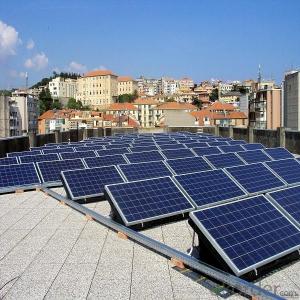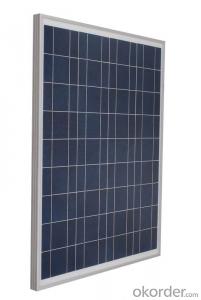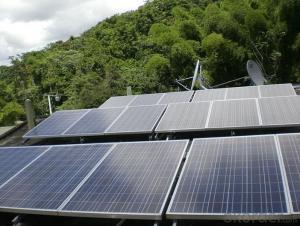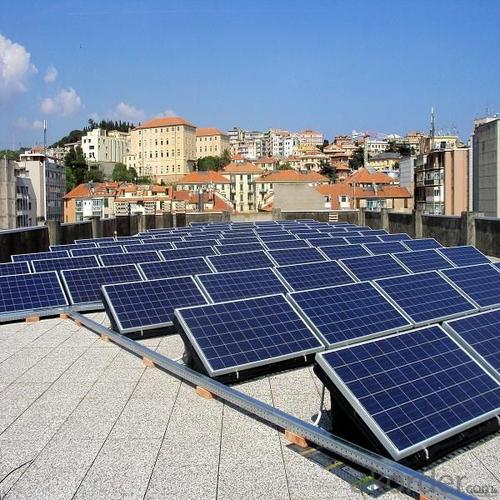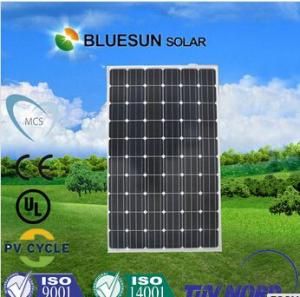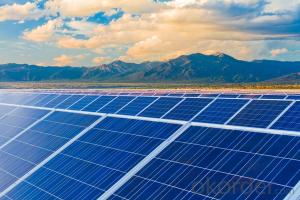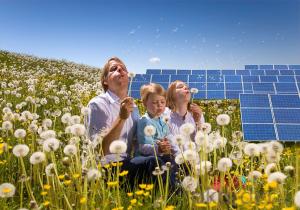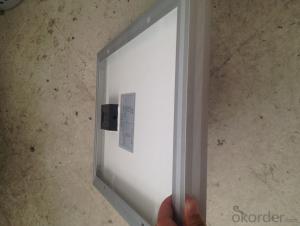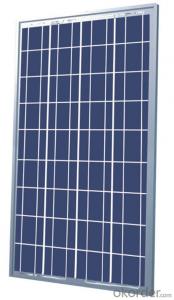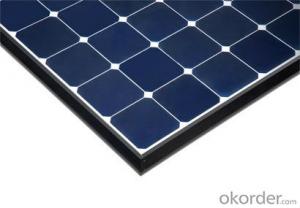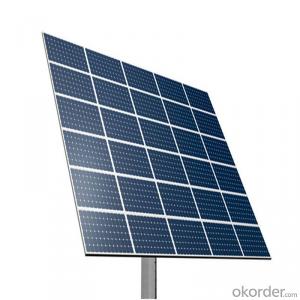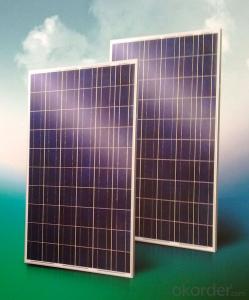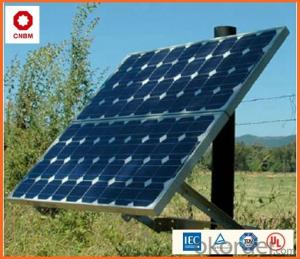Portable 200w Solar Panels 20W Small Off Grid Solar Power System with Low Price
- Loading Port:
- Tianjin
- Payment Terms:
- TT OR LC
- Min Order Qty:
- 1000 watt
- Supply Capability:
- 10000000 watt/month
OKorder Service Pledge
OKorder Financial Service
You Might Also Like
Specification
Product Description
Key Specifications/Special Features
Maximum power: 20Wp
Maximum power voltage (V): 18.00
Maximum power current (A): 3.89
Open circuit voltage (V): 21.60
Short circuit current (A): 4.14
Number of cells: 36
Size of module (mm): 62.5 x 62.5mm
Temperature coefficients of Isc (%): 1,000V
Temperature coefficients of Voc (%): + 0.1/°C
Temperature coefficients of Pm (%): -0.38/°C
Temperature coefficients of Im (%): -0.47/°C
Temperature coefficients of Vm (%): +0.1/°C
Temperature range: -0.38/°C
Surface maximum load capacity: -40C to +85C
Allowable hail load: 60m/s(200kg/sq.m)
Connectors and cables type: PV-0502( TUV )
Warranty: 10 years product warranty
Quantity of one 20ft container: e70%
Quantity of one 40ft HQ container: 5,000pcs
Quantity of one 40ft HQ container: 10,000pcs
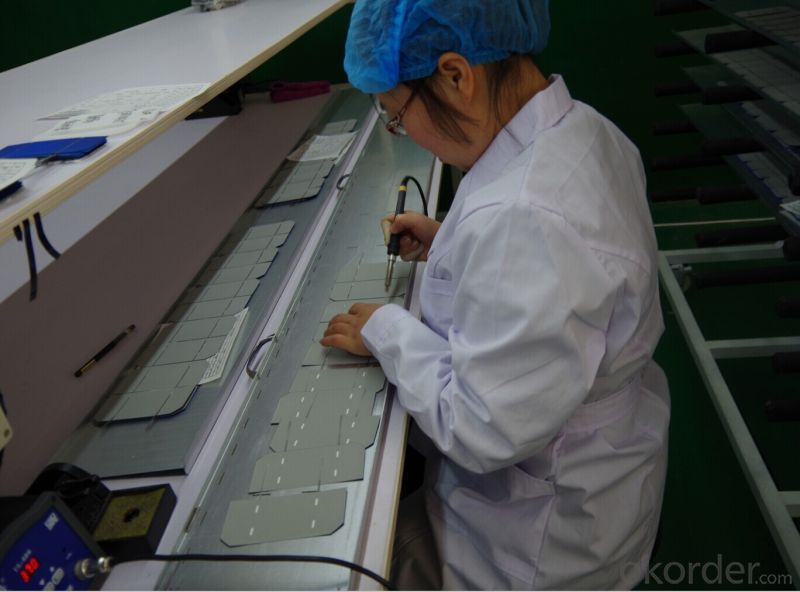
Product Details
| Electrical Data | Module Size | Weight | Number of cells series | ||||
| Nominal Power | Max-Power | Max-Power | Open-Circuit | Short-Circuit | |||
| Voltage | Current | Voltage | Current | ||||
| Pmax | VMPP | IMPP | VOC | ISC | |||
| W | V | A | V | A | mm | Kg | pc |
| 10 | 17.2 | 0.58 | 21.6 | 1.31 | 340*254*17 | 1.2 | 36 |
| 20 | 17.2 | 1.16 | 21.6 | 1.93 | 340*460*25 | 1.8 | 36 |
| 30 | 17.2 | 1.74 | 21.6 | 2.57 | 350*670*30 | 3 | 36 |
| 40 | 17.2 | 2.32 | 21.6 | 3.23 | 450*670*30 | 3.5 | 36 |
| 50 | 17.2 | 2.91 | 21.6 | 3.86 | 550*670*30 | 4.5 | 36 |
| 60 | 17.2 | 3.49 | 21.6 | 3.86 | 603*670*30 | 5.3 | 36 |
| 70 | 17.2 | 4.07 | 21.6 | 4.51 | 758*670*30 | 6 | 36 |
| 80 | 17.2 | 4.65 | 21.6 | 5.17 | 758*670*30 | 6.5 | 36 |
| 90 | 17.2 | 5.23 | 21.6 | 5.81 | 935*670*30 | 6.7 | 36 |
| 100 | 17.2 | 5.8 | 21.6 | 6.46 | 935*670*30 | 6.7 | 36 |
| 110 | 17.2 | 6.4 | 21.6 | 7.08 | 1061*670*35 | 8 | 36 |
| 120 | 17.2 | 6.98 | 21.6 | 7.72 | 1161*670*35 | 8.6 | 36 |
| 130 | 17.2 | 7.56 | 21.6 | 8.4 | 1277*670*35 | 9.8 | 36 |
| 140 | 17.2 | 4 | 21.6 | 4.4 | 1480*670*35 | 10.9 | 36 |
| 150 | 17.2 | 4.17 | 21.6 | 4.58 | 1480*670*35 | 10.9 | 36 |
| 160 | 34.4 | 4.65 | 43.2 | 5.17 | 1480*670*35 | 10.9 | 72 |
| 170 | 34.4 | 4.94 | 43.2 | 5.49 | 1172*983*35 | 11.7 | 72 |
| 180 | 34.4 | 5.23 | 43.2 | 5.81 | 1172*983*35 | 11.7 | 72 |
| 190 | 34.4 | 5.52 | 43.2 | 6.14 | 1260*983*35 | 14.6 | 72 |
| 200 | 34.4 | 5.81 | 43.2 | 6.5 | 1260*983*35 | 14.6 | 72 |
| 210 | 34.4 | 6.1 | 43.2 | 6.85 | 1488*983*35 | 14.6 | 72 |
| 220 | 34.4 | 6.4 | 43.2 | 7.08 | 1488*983*35 | 15.2 | 72 |
- Q: in a solar panel, i know that the electrons are knocked loose and used as energy, what happens to the protons?
- silicon based photovoltaic cells used some boron as dopant. i dont understand if that helps supress proton pastime, the way they be conscious boron on supressing run away nuclear reaction.... im clueless as you
- Q: when we say a solar panel has 20% efficiency, do we mean that it converts 20% of sunlight reaching it into electricity or that it converts 20% of visible light(which is only 7% of sunlight) into electricity?
- Photo-voltaic solar cells use the visible light range (photons) for the conversion of sun's rays to electrical energy. The potential of solar radiation is ,353 Watts per square meter, but that is mostly a measure of heat, or infrared radiation. The visible light is actually a small portion of the spectrum. You have struck on a problem associated with photo-voltaic cells. Infrared radiation acts to heat up p-v cells (heat stress), causing them to be much less efficient. It would be interesting to see a hybrid p-v panel that is cooled with fluid or air running through it. This would increase efficiency of the p-v process while providing a heating source. This in turn could be used directly for heating or for production of electricity through a generator system.
- Q: I have a home in Manchester Tn and we have been slowly remodeling the home. It is about 200 sq ft of living space. Our normal electric bill is about 50 a month. We would like to add some solar panels to the home to help reduce the amount of the bill. How many panels do I need and what would be the cost? I am not trying to go completely of the grid but I would like to start somewhere and maybe over the years be able to add. What is your recommendation for a reasonable cost of under 2 to 3 k??
- Unless there has been some major breakthrough in solar panel efficiency - Forget it. I had looked at some utility interactive systems where the electricity generated by the solar panels went through a special inverter and into the electrical system of the house, any power you didn't use went backwards through the meter and into the grid. I figured that even if it was sunny every day, it would take about 20 years to break even on the system. That is, if I had invested $5,000 in a small system, to save $5,000 off the electric bill would take 20 years. If I had $5,000 to invest, this wouldnt be the place! It would take much more than 20 years of electrical savings to match even a modest investment. Then, don't forget what happens if 0 years from now the inverter or some of the panels fail and need replaced. Invest in fluorescent lights, maybe even LEDs. You will see a much quicker return on investment. Install more insulation, put in a heat-pump system. I appreciate you desire to save some energy, solar just isn't going to be worth doing, at least not yet.
- Q: if so, would it be possible to make (or remake) an organism that could subsist off of sunlight and external heat like plants?
- No, there are organisms like that for instance coral, but in order for them to give us energy we would need to fuse are DNA with theirs
- Q: Has anyone had roof problems caused by rooftop solar panels?
- Rooftop solar panels might cause all sorts of maintenance or poor installation problems but I rather doubt at this point if we can say that there is an issue with solar panels in general that will cause a problem with the roof. Rather solar panels tend to shade a roof on its most exposed side. Without solar panels southern facing roofs will wear out faster than northern facing roofs. Installed solar panels will tend to make the roof last longer.
- Q: Interested in buying solar panels to save on electric bill.Any government help plans?
- I live in Ohio so I'm not sure if this is nationwide, but in Ohio there are grants you can apply for if you're investing in alternative energy for your house. I would look into those grants if they're available in your area.
- Q: If you buy everything you need for a grid-tied solar set up, can you install it yourself or is it required that a professional installs it?
- For safety purposes and liability, I do suggest that you should hire a professional solar panel installer. The solar panels has a lot of engineered like work, So better hire someone who has a fully aware for this work.
- Q: How do solar panels withstand hail and other extreme weather conditions?
- Solar panels are designed to withstand hail and extreme weather conditions through their durable construction and protective measures. They are built with tempered glass that can resist impact and damage from hail. Additionally, solar panels undergo rigorous testing to ensure they can withstand high winds, heavy snow loads, and extreme temperatures. The frames and mounting systems are also engineered to provide stability and withstand harsh weather conditions.
- Q: Can you connect a solar panel to speakers that use a wall outlet plug, by cutting the plug off and connect copper wire between the solar panel and cord?Confusing i know. I'm trying to connect a solar panel to speakers for a science project.
- The okorder .
- Q: planning to get one, for a store/house, we use alot of electricity at least 500-3000 dollars a month. how much money would this save us? how big would we have to get the solar panel?[aproximately]
- Hi, One or two new windmills may not cost you as much I believe. Just my suggestion anyway.
Send your message to us
Portable 200w Solar Panels 20W Small Off Grid Solar Power System with Low Price
- Loading Port:
- Tianjin
- Payment Terms:
- TT OR LC
- Min Order Qty:
- 1000 watt
- Supply Capability:
- 10000000 watt/month
OKorder Service Pledge
OKorder Financial Service
Similar products
Hot products
Hot Searches
Related keywords
